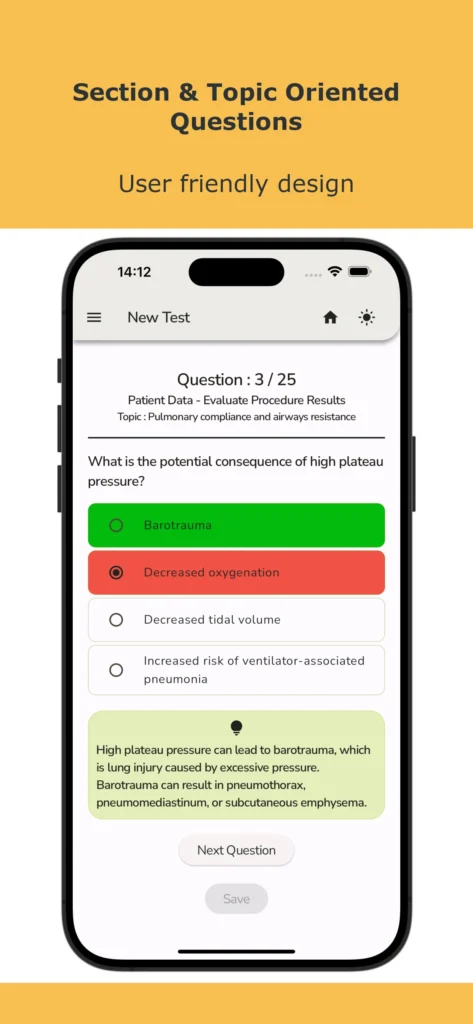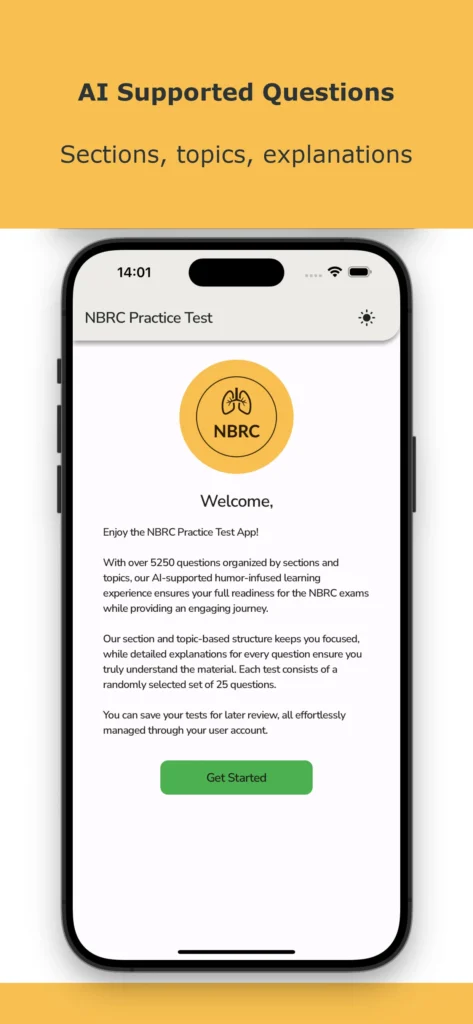Introduction
Welcome to the National Board for Respiratory Care (NBRC), the leading organization for respiratory care credentialing and professional development. Whether you are a current respiratory therapist or aspiring to become one, the NBRC is here to support you on your path to excellence.
Established in 1960, the NBRC is dedicated to promoting the highest standards of respiratory care through rigorous examinations, continuing education, and certification programs. Our mission is to ensure that respiratory therapists possess the knowledge and skills necessary to provide safe and effective care to patients with respiratory conditions.
As the primary credentialing body for respiratory therapists in the United States, the NBRC offers a range of certifications that validate the competence and expertise of respiratory care practitioners. These certifications include the Certified Respiratory Therapist (CRT), Registered Respiratory Therapist (RRT), and specialty credentials such as Neonatal/Pediatric Respiratory Care Specialist (NPS) and Sleep Disorders Testing and Therapeutic Intervention Specialist (SDS).
Whether you are just starting your journey in respiratory care or looking to advance your career, the NBRC’s certification programs provide a clear pathway for professional growth. Our examinations are designed to assess your knowledge, skills, and critical thinking abilities, ensuring that you are well-prepared to meet the challenges of the field.
Continuing education is a vital component of maintaining your NBRC credentials. We offer a variety of opportunities for respiratory therapists to earn Continuing Respiratory Care Education (CRCE) credits, including online courses, conferences, and workshops. By staying current with the latest advancements in respiratory care, you can enhance your clinical practice and demonstrate your commitment to lifelong learning.
At the NBRC, we are committed to supporting respiratory therapists throughout their careers. Our website provides a wealth of resources, including practice exams, study guides, and informational articles. We also offer a comprehensive database of accredited respiratory care programs, helping aspiring respiratory therapists find the educational opportunities that best suit their needs.
Join the thousands of respiratory therapists who have chosen the NBRC as their partner in professional development. Whether you are seeking initial certification or looking to maintain your credentials, the NBRC is here to help you achieve your goals and excel in the field of respiratory care.
NBRC Examinations
Introduction to NBRC Examinations
The National Board for Respiratory Care (NBRC) offers a range of examinations that are essential for respiratory care professionals looking to advance their careers and demonstrate their expertise. These examinations are designed to assess the knowledge, skills, and abilities required to provide high-quality respiratory care.
Whether you are a recent graduate or an experienced practitioner, the NBRC examinations provide a valuable opportunity to validate your skills and enhance your professional standing. In this section, we will explore the different examinations offered by the NBRC and provide you with important information to help you prepare for success.
The RRT Credential
What is the RRT Credential?
The RRT (Registered Respiratory Therapist) credential is a professional certification offered by the National Board for Respiratory Care (NBRC). It is the highest level of certification for respiratory therapists and signifies advanced knowledge and skills in the field.
Respiratory therapists who hold the RRT credential have demonstrated their competence in providing respiratory care to patients of all ages, from infants to the elderly. They are equipped to handle complex cases and are trained to work in a variety of healthcare settings, including hospitals, clinics, and home care.
Obtaining the RRT credential is a significant achievement for respiratory therapists, as it validates their expertise and dedication to their profession.
Requirements for the RRT Credential
To be eligible for the RRT credential, respiratory therapists must meet certain requirements set by the NBRC. These requirements include:
- Successful completion of an accredited respiratory therapy program
- Passing the NBRC Therapist Multiple-Choice (TMC) Examination
- Completing the NBRC Clinical Simulation Examination (CSE)
The TMC Examination assesses the therapist’s knowledge and understanding of respiratory therapy principles and practices. It covers topics such as patient assessment, therapeutic procedures, and equipment management.
The CSE evaluates the therapist’s ability to apply their knowledge and skills in simulated patient care scenarios. It tests their critical thinking, decision-making, and technical proficiency.
Passing Score for the RRT Exam
The passing score for the RRT exam is determined by the NBRC and may vary from year to year. It is based on the performance of a representative sample of respiratory therapists who take the exam.
Respiratory therapists who achieve the passing score on both the TMC and CSE exams are awarded the RRT credential and can use the designation after their name.
Continuing Education for RRTs
Once respiratory therapists obtain the RRT credential, they are required to maintain their competence through continuing education. The NBRC requires RRTs to earn a certain number of Continuing Education Units (CEUs) within a specified timeframe.
CEUs can be earned through various educational activities, such as attending conferences, completing online courses, or participating in research projects. These activities help RRTs stay up-to-date with the latest advancements in respiratory therapy and ensure that they continue to provide high-quality care to their patients.
Conclusion
The RRT credential is a testament to the knowledge, skills, and dedication of respiratory therapists. It represents their commitment to excellence in the field of respiratory care and their ongoing pursuit of professional development. By obtaining the RRT credential, respiratory therapists demonstrate their expertise and ensure that they are equipped to provide the best possible care to their patients.
Benefits of NBRC Credentials
Why Should You Pursue NBRC Credentials?
Obtaining credentials from the National Board for Respiratory Care (NBRC) can open up a world of opportunities for respiratory care professionals. Whether you are just starting your career or looking to advance to the next level, NBRC credentials can provide numerous benefits.
1. Recognition and Credibility
Having NBRC credentials demonstrates your commitment to excellence and professionalism in the field of respiratory care. Employers and colleagues recognize the rigorous standards set by the NBRC, and holding these credentials can enhance your reputation and credibility.
2. Career Advancement
NBRC credentials can significantly boost your career prospects. Many employers prefer or require respiratory therapists to hold NBRC credentials, especially for advanced positions. By obtaining these credentials, you can stand out from other candidates and increase your chances of landing your desired job or promotion.
3. Expanded Job Opportunities
With NBRC credentials, you become eligible for a wider range of job opportunities. Many healthcare facilities, including hospitals, clinics, and home healthcare agencies, specifically seek out respiratory therapists with NBRC credentials. These credentials can open doors to exciting and fulfilling career paths.
4. Professional Development
The process of obtaining NBRC credentials involves rigorous education, training, and examination. This journey not only enhances your knowledge and skills but also promotes continuous professional development. By staying up-to-date with the latest advancements in respiratory care, you can provide the best possible care to your patients.
5. Networking and Community
Being part of the NBRC community allows you to connect with other respiratory care professionals. You can attend conferences, workshops, and networking events to exchange knowledge, share experiences, and build valuable relationships. These connections can provide support, mentorship, and collaboration opportunities throughout your career.
6. Personal Satisfaction
Obtaining NBRC credentials is a significant achievement that can bring a sense of personal satisfaction and pride. Knowing that you have met the high standards set by the NBRC and have the skills to provide excellent respiratory care can boost your confidence and motivation.
Conclusion
Obtaining NBRC credentials offers numerous benefits, including recognition, career advancement, expanded job opportunities, professional development, networking, and personal satisfaction. By pursuing these credentials, you can elevate your career in respiratory care and make a positive impact on the lives of patients.
Requirements for NBRC Certification
Understanding the Requirements for NBRC Certification
If you’re considering a career in respiratory care, obtaining certification from the National Board for Respiratory Care (NBRC) is an essential step towards excellence in this field. NBRC certification not only validates your knowledge and skills but also enhances your professional credibility and opens up a world of opportunities.
Before embarking on your journey towards NBRC certification, it’s crucial to understand the requirements you need to fulfill. Let’s explore the key prerequisites for obtaining NBRC certification:
Educational Requirements
To be eligible for NBRC certification, you must first complete a respiratory care program accredited by the Commission on Accreditation for Respiratory Care (CoARC) or an equivalent accrediting body. These programs typically include a combination of classroom instruction, laboratory work, and clinical rotations to provide you with a comprehensive understanding of respiratory care principles and practices.
Once you’ve successfully completed an accredited program, you’ll be awarded an associate or bachelor’s degree in respiratory care, depending on the level of education you pursued.
Examination Requirements
After fulfilling the educational requirements, the next step towards NBRC certification is passing the required examinations. The specific exams you need to take depend on the level of certification you’re seeking:
- For entry-level certification as a Certified Respiratory Therapist (CRT), you must pass the Therapist Multiple-Choice (TMC) Examination.
- For advanced-level certification as a Registered Respiratory Therapist (RRT), you must pass both the TMC Examination and the Clinical Simulation Examination (CSE).
The TMC Examination assesses your knowledge of respiratory care principles, patient assessment, and equipment operation, while the CSE evaluates your clinical decision-making and critical thinking skills through realistic patient scenarios.
Continuing Education Requirements
Once you’ve obtained NBRC certification, it’s important to maintain your knowledge and skills through continuing education. The NBRC requires certified respiratory therapists to earn Continuing Respiratory Care Education (CRCE) credits to renew their certification.
For CRTs, a minimum of 30 CRCE credits must be earned every five years, while RRTs must earn a minimum of 45 CRCE credits within the same timeframe. These credits can be obtained through various educational activities, such as attending conferences, completing online courses, or participating in workshops.
Passing Score and Recertification
When taking the NBRC exams, it’s natural to wonder about the passing score. The passing score for the TMC Examination is determined by the NBRC based on a standardized scoring process. Similarly, the passing score for the CSE is also determined by the NBRC.
Once you’ve obtained NBRC certification, it’s valid for a period of five years. To maintain your certification, you must complete the recertification process, which involves meeting the continuing education requirements and submitting the necessary documentation to the NBRC.
By fulfilling the educational requirements, passing the required exams, and staying up-to-date with continuing education, you can ensure that you meet the requirements for NBRC certification and pave the way for a successful career in respiratory care.
Conclusion
In conclusion, the National Board for Respiratory Care (NBRC) is the premier organization for respiratory care professionals looking to achieve excellence in their field. By offering rigorous board exams, continuing education opportunities, and setting high standards for certification, the NBRC ensures that respiratory therapists are well-prepared and knowledgeable in providing the highest quality care to patients.
Throughout this post, we have explored the various aspects of the NBRC, including its role in certification, the requirements for becoming a Registered Respiratory Therapist (RRT), and the importance of continuing education. We have also discussed the passing score for the NBRC RRT exam and the number of CEUs required for courses such as PALS and ACLS.
It is important to note that the NBRC is not to be confused with the National Brain Research Centre (NBRC) or any other organization with a similar acronym. The NBRC specifically focuses on respiratory care and is dedicated to advancing the profession and ensuring the highest standards of patient care.
By obtaining certification through the NBRC, respiratory therapists demonstrate their commitment to professionalism, expertise, and the highest level of patient care. This certification not only enhances their career opportunities but also provides reassurance to patients and employers that they are receiving care from a qualified and competent professional.
In summary, the NBRC plays a vital role in the respiratory care field by setting standards, administering board exams, and promoting continuing education. It is the go-to organization for respiratory therapists who are dedicated to excellence and continuous professional development. Whether you are a current respiratory therapist or aspiring to enter the field, the NBRC is your pathway to success and the key to achieving excellence in respiratory care.








